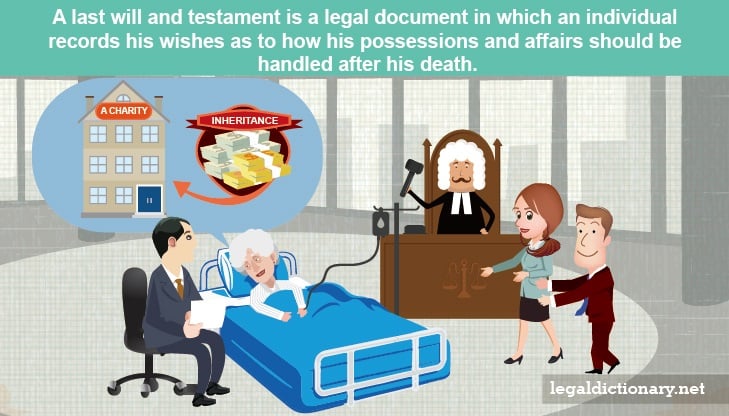Last Will and Testament
A Last Will and Testament, now most commonly referred to simply as a “Will,” is a legal document in which an individual records his wishes as to how his possessions and affairs should be handled after his death. The individual making the Will may specify, for example, who should take custody of his children, and which heirs should be given certain specified assets. To explore this concept, consider the following Last Will and Testament definition.
Definition of Last Will and Testament
- noun. The words “will” and “testament” mean the same thing, referring to a statement directing the disposition of one’s personal property upon death.
Origin 1250-1300 Middle English
What is a Last Will and Testament
Historically, the terms Will and Testament referred to a legal document created by an individual, called a “testator,” naming a person to manage his estate, and distribute his property, after his death. Because the term “Will” generally referred to the disposition of real property, and the term “Testament” applied to the disposition of personal property, the terms were joined into the single designation of Last Will and Testament, which was popular for many years. In modern times, the moniker has been shortened in popular use, with laypeople and legal professionals alike referring to such a document simply as a “Will.”
How to Write a Last Will and Testament
While many people choose to have an attorney assist them in creating their Wills, it is not necessary for most. Any person over the age of majority, 18 years in most states, and of sound mind, can create his own Will. Each state’s probate code specifies certain requirements for the creation of a Will in order for it to be considered valid by the court if challenged. Once those requirements are met, the testator can basically include anything he likes, from instructions for the distribution of his assets, to statements he would like made to certain individuals after his death. Required elements of a valid Will often include:
- Identity of the Testator – the person creating the Will must identify himself, and state that a Will is being made. This requirement is typically satisfied by the phrase “Last Will and Testament of [inserting the testator’s name]” on the front of the document.
- Revoke Previous Wills and Codicils – a statement must be made that all previously made Wills and codicils (additions to a will) are revoked upon the making of the current Will. If this is not done, a new Will supersedes an old Will only to the extent that they are different. This could be confusing.
- Sound Mind and Free Will – a statement should be made that the testator has the clarity of mind to make a Will, and that he does so of his own free will, without coercion.
- Signatures – many jurisdictions require the testator to sign and date the Will by hand, in the presence of a minimum of two witnesses who have no connection to the Will. Additionally, many jurisdictions require that all signatures be validated by a notary public, though some states acknowledge the validity of handwritten Wills without witnesses.
- Numbered Pages – it is considered important to number each page of a Will, most legal professionals numbering them “page x of y,” and having the testator initial each page next to the page number, and signing in blue ink on the last page of the Will. This helps ensure the Will can be validated, minimizing the ability for someone to insert changes into the Will.
Using a Last Will and Testament Form
A Will can be as simple or as complex as the testator desires, and indeed, many people who have a large number of assets to distribute, hire an attorney to create important estate planning documents. The average individual, however, can certainly create his own Will, and may find that a Last Will and Testament form is perfect for his needs. Such forms can be found online, as well as in many stationery or office supply stores. These Last Will and Testament forms require the testator to fill in the blanks, name an executor, and describe how he would like his possessions distributed.
The Effect of a Will on Probate
Whether or not an individual had a Will at the time he or she passed has nothing to do with whether the estate will go through probate. It does, however, determine how the estate will be transferred during the probate process. In the event there is a Will, the court will generally allow distribution of assets according to the decedent’s instructions. If there is no Will, referred to as dying “intestate,” or if the Will covers only part of the decedent’s estate, the estate will be distributed according to the state’s laws of heirship. It is important to know that only an original Will can be submitted to the probate court. In the event no original can be found, or an attempt is made to introduce a photocopy of a Will, the court usually handles the estate as intestate.
Related Legal Terms and Issues
- Assets – Property or finances owned by an individual or entity, and regarded as having value.
- Codicil – A supplement to an existing Will, containing an addition, modification, or explanation of something in the Will.
- Decedent – A person who has died.
- Personal Property – Any item that is moveable and not fixed to real property.
- Probate – The court process by which a Will is proved valid or invalid.
- Real Property – Land and property attached or fixed directly to the land, including buildings and structures.

